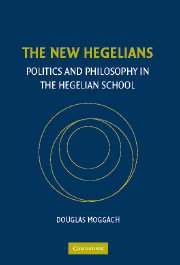Book contents
- Frontmatter
- Contents
- Acknowledgements
- Contributors
- Introduction: Hegelianism, Republicanism, and Modernity
- 1 Eduard Gans on Poverty and on the Constitutional Debate
- 2 Ludwig Feuerbach's Critique of Religion and the End of Moral Philosophy
- 3 The Symbolic Dimension and the Politics of Left Hegelianism
- 4 Exclusiveness and Political Universalism in Bruno Bauer
- 5 Republican Rigorism and Emancipation in Bruno Bauer
- 6 Edgar Bauer and the Origins of the Theory of Terrorism
- 7 Ein Menschenleben: Hegel and Stirner
- 8 ‘The State and I’: Max Stirner's Anarchism
- 9 Engels and the Invention of the Catastrophist Conception of the Industrial Revolution
- 10 The Basis of the State in the Marx of 1842
- 11 Marx and Feuerbachian Essence: Returning to the Question of ‘Human Essence’ in Historical Materialism
- 12 Freedom and the ‘Realm of Necessity’
- 13 Work, Language, and Community: A Response to Hegel's Critics
- Bibliography
- Index
10 - The Basis of the State in the Marx of 1842
Published online by Cambridge University Press: 22 August 2009
- Frontmatter
- Contents
- Acknowledgements
- Contributors
- Introduction: Hegelianism, Republicanism, and Modernity
- 1 Eduard Gans on Poverty and on the Constitutional Debate
- 2 Ludwig Feuerbach's Critique of Religion and the End of Moral Philosophy
- 3 The Symbolic Dimension and the Politics of Left Hegelianism
- 4 Exclusiveness and Political Universalism in Bruno Bauer
- 5 Republican Rigorism and Emancipation in Bruno Bauer
- 6 Edgar Bauer and the Origins of the Theory of Terrorism
- 7 Ein Menschenleben: Hegel and Stirner
- 8 ‘The State and I’: Max Stirner's Anarchism
- 9 Engels and the Invention of the Catastrophist Conception of the Industrial Revolution
- 10 The Basis of the State in the Marx of 1842
- 11 Marx and Feuerbachian Essence: Returning to the Question of ‘Human Essence’ in Historical Materialism
- 12 Freedom and the ‘Realm of Necessity’
- 13 Work, Language, and Community: A Response to Hegel's Critics
- Bibliography
- Index
Summary
In his 1837 “letter to his father,” Marx famously describes how he became a Hegelian:
From the idealism which, by the way, I had compared and nourished with the idealism of Kant and Fichte, I arrived at the point of seeking the Idea in the actual itself [im Wirklichen selbst]. If previously the gods had dwelt above the earth, now they became its centre. … I had read fragments of Hegel's philosophy, the grotesque craggy melody of which did not appeal to me. Once more I wanted to dive into the sea, but with the definite intention of finding that spiritual nature [die geistige Natur] is just as necessary, concrete and firmly based as physical nature [die körperliche] …
In his first notebook on Epicurean philosophy of 1839, Marx tersely identifies “spiritual nature” with the state, and in fact Hegel himself in the Philosophy of Right describes the system of right, which provides the institutional structure of the state, as a “second nature,” a nature grounded in spirit in the same way that physical nature is grounded in the Idea: “The system of right is the realm of actualised freedom, the world of spirit produced from within itself as a second nature.” Thus in 1837 Marx was setting himself the project of showing that the state is “firmly based” in some underlying essence of which it is the realisation or actualisation, just as for Hegel physical nature is the realisation of the Idea.
- Type
- Chapter
- Information
- The New HegeliansPolitics and Philosophy in the Hegelian School, pp. 220 - 241Publisher: Cambridge University PressPrint publication year: 2006
- 4
- Cited by



